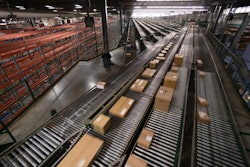
The holiday season may be the most lucrative time of year for your business, but it is also accompanied by a heightened risk of return fraud. Fraudsters have grown increasingly sophisticated in their efforts to find and exploit gaps within supply chains and return policies. So whether you’re a retailer, distributor or supplier, you need to take steps to avoid inventory and revenue losses caused by return fraud.
The key to mitigating the risk of return fraud this holiday shopping season is transparency within the supply chain. More specifically, there’s a technology solution that you and your partners can leverage for increased visibility into every step of a product’s journey through the sales cycle.
The foundation of this technology is built on systematically capturing and transmitting a product’s unique identifier to a secure database at any stage of the sales lifecycle. That identifier is stored for future queries and on-demand return validation. Think of the unique identifier as a product’s fingerprint, which is typically the UPC and serial number. As the product moves throughout the supply chain—from assembly to shipment to consumer sale and return—its unique identifier is captured each step of the way, creating a product history that can be used to combat unwarranted returns and fraud.
Here are a few specific instances showing how this technology can protect your business from return fraud.
Cargo Theft
Even before the holiday shopping rush kicks off, businesses risk losing inventory while units are shipped from manufacturers to retailers. Cargo theft can be a particularly difficult problem to address because the type and number of missing products can vary from case to case. In these situations, a database of unique identifiers for the individual stolen products can help suppliers and retailers coordinate their recovery with law enforcement. Retailers can also integrate the database with their point-of-sale systems so employees know in real time when a customer is attempting to return a product that has been flagged as lost or stolen.
New vs. Refurbished Products
When a consumer attempts to return a product, it’s common practice for retail employees to open the box and confirm that the customer isn’t returning an empty container (or one with a different product inside). Some fraudsters may even attempt to pass off a refurbished product as a brand-new item. By leveraging a system that tracks unique identifiers, a manufacturer can ensure its retail partners have the information they need to determine whether a product is fresh off the assembly line or back from a second trip to the factory for refurbishing.
Sales Promotions and Return Policies
Sale promotions and return policies often differ between stores, and fraudsters have turned their attention toward exploiting these differences. A shared database can track when, where and for how much a product was sold so retailers can ensure they’re refunding the proper amount to a customer, even if a product was originally sold at a different location, including online. In addition to deterring fraudsters, this approach also helps retailers quickly process returns for legitimate customers who may not be aware they’re receiving a refund for more than what they originally paid.
This technology can empower your staff and partners to minimize the risk of return fraud both during the holiday season and throughout the rest of the year. By sharing access to a database of unique identifiers, everyone involved in the supply chain can collaboratively protect their businesses while facilitating a seamless experience for loyal customers.
With more than 20 years of experience in account management in software, hardware and internet technologies, Kristin Secreto is the vice president, general manager of InComm Product Control, a product lifecycle tracking solution that enables retailers and manufacturers to make smart and timely decisions about product logistics, sales and returns. Using its OmniTrace™ and ReturnFlex product tracking technology, InComm Product Control reduces shrinkage and deters return fraud.



















